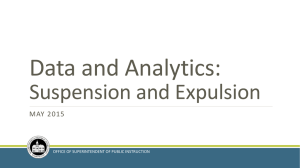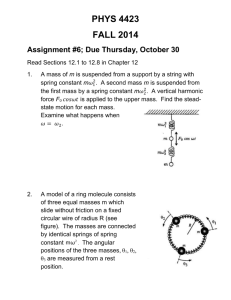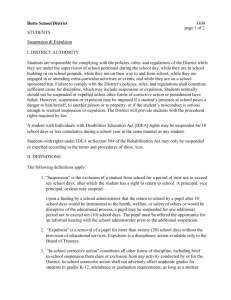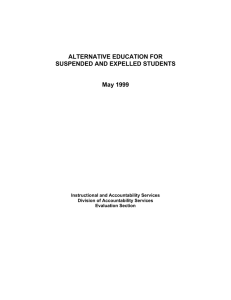Analytics: Suspension/Expulsion Graduation
advertisement
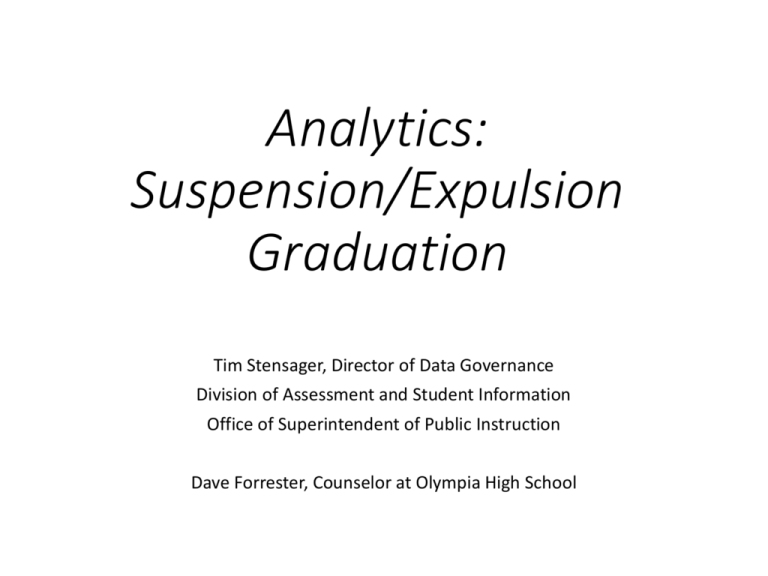
Analytics: Suspension/Expulsion Graduation Tim Stensager, Director of Data Governance Division of Assessment and Student Information Office of Superintendent of Public Instruction Dave Forrester, Counselor at Olympia High School What is the problem Why are we talking about this Postsecondary Education OPPORTUNITY, Number 237b, Mortenson Time Annual Bi-Annual K-12 Warehouse/CEDARS Monthly Weekly Student Information System (SIS) Daily Tactical Teacher/ Counselor Grade Lev/ School Dept District School Brd OSPI/ESD State/Leg/Gov/ Federal Gov Policy Strategic Items of Note: 1. Suspension Reference = Out of School Suspension & Expulsion 2. Microsoft Office Professional Plus 2013 required for full view of Analytics Student Discipline: Understanding the Context How many students are suspended or expelled? Who is suspended or expelled? How many times are they suspended or expelled? How long are they removed? For what behaviors? How many students are suspended or expelled? Approximately 4% of all Washington students were suspended or expelled during the 2014–15 school year. The rate of suspensions and expulsions across districts vary—from nearly 0% to over 10% of students in a district. Percentage of distinct students with EX, SS, LS by district 20.0% 18.0% 16.0% 14.0% 12.0% 10.0% 8.0% 6.0% This red line is the state avg. @ 4.2% of all students 4.0% 2.0% 0.0% Student Discipline: Understanding the Context How many students are suspended or expelled? Who is suspended or expelled? How many times are they suspended or expelled? How long are they removed? For what behaviors? Who is suspended or expelled? According to state and national data, in many schools, male students, students of color, and students with disabilities are suspended and expelled more frequently than other students. These trends warrant attention from schools, as well as OSPI, to work toward equitable outcomes for each student. Schools must carefully review their student discipline data to consider whether discriminatory policies, procedures, or practices exist and to remedy them. Proportionality Or Composition Index Suspension / Expulsion Rate 100 students in the district 20 were suspended one or more times Suspension Rate 20 students suspended 100 total students = 20% Enrollment Overview 100 students in the district 40% are boys 60% are girls Proportionality or Composition Index 100 students in the district 40% are boys S S S S S S S S S S S S S S S S S S S S 80% of the suspensions are boys Composition Index: Boys are 80% of suspensions Boys are 40% of student enrollment =2 The percentage of suspensions who are boys is 2 times greater than their percentage in the student population. The Desire Is Proportionality • To have the percentage of suspensions who are boys to be equal their percentage in the student population. 40%/40% =1 • This desire would hold true for any group of students by race or program: 1 or close to 1 is the target Franklin Pierce 6.1% By using filters, select the range of the composition index And/or select the group to analyze You must only select One group and deselect the other. Do not combine And/or select the discipline rate What is not shown with these data? How many students are suspended or expelled? Who is suspended or expelled? How many times are they suspended or expelled? How long are they removed? For what behaviors? Go To Incident Per Student Slides Graduation: Understanding the Context How many students Graduate? Who Graduates? Franklin Pierce 78.5% Graduation: Understanding the Context How many students Graduate? Who Graduates? Graduation Numbers will Compile and won’t make sense. De-select Items Don’t Select More Than One Where do I go for help? For Analytics Questions: Tim Stensager Data Governance, OSPI (360) 725-6005 Tim.stensager@k12.wa.us For Data Sheet Questions: Susan Canaga Data Quality, OSPI (360) 725-4473 Susan.Canaga@k12.wa.us
